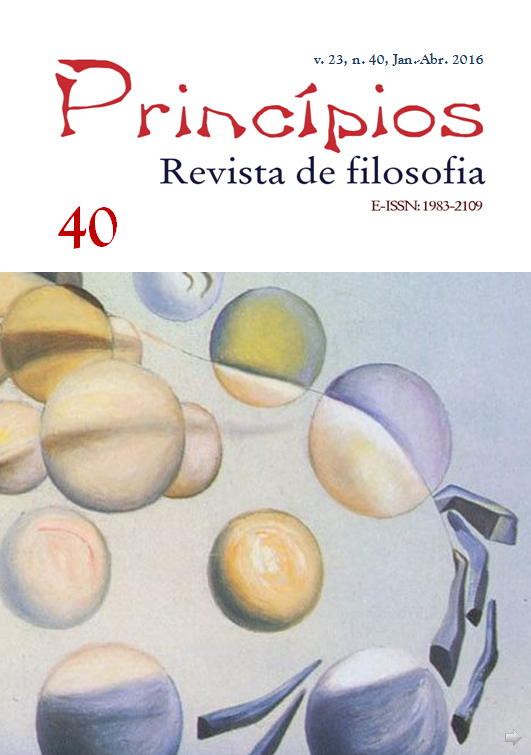Reconditioning the conditional [Recondicionando o condicional]
DOI:
https://doi.org/10.21680/1983-2109.2016v23n40ID7481Palavras-chave:
Indicative conditionals, Probability, Triviality, Deductive dependence, Adams, Lewis, Ramsey, StalnakerResumo
Many authors have hoped to understand the indicative conditional construction in everyday language by means of what are usually called conditional probabilities. Other authors have hoped to make sense of conditional probabilities in terms of the absolute probabilities of conditional statements. Although all such hopes were disappointed by the triviality theorems of Lewis (1976), there have been copious subsequent attempts both to rescue CCCP (the conditional construal of conditional probability) and to extend and to intensify the arguments against it. In this paper it will be shown that triviality is avoidable if the probability function is replaced by an alternative generalization of the deducibility relation, the measure of deductive dependence of Miller and Popper (1986). It will be suggested further that this alternative way of orchestrating conditionals is nicely in harmony with the test proposed in Ramsey (1931), and also with the idea that it is not the truth value of a conditional
statement that is of primary concern but its assertability or acceptability.
Downloads
Referências
ADAMS, E. W. The logic of conditionals. Inquiry, v. 8, p. 166–197, 1965.
ADAMS, E. W. A Primer of Probability Logic. Stanford-CA: Center for the Study of Language and Information, 1998.
ARLÓ-COSTA, H. Bayesian epistemology and epistemic conditionals: on the status of the export-import laws. The Journal of Philosophy, v. XCVIII, p. 555–593, 2001.
ARLÓ-COSTA, H. The logic of conditionals. In: ZALTA, E. N. (Ed.). The Stanford Encyclopedia of Philosophy. Summer 2014. [s.n.], 2014. Disponível em: <http://plato.stanford.edu/archives/sum2014/entries/logic-conditionals/>.
BOLZANO, B. P. J. N. Wissenschaftslehre. Sulzbach: Seidelsche Buchhandlung, 1837. English translation 2014: Theory of Science. New York: Oxford University Press.
EDGINGTON, D. M. D. Conditionals. In: ZALTA, E. N. (Ed.). The Stanford Encyclopedia of Philosophy. Spring 2014. [s.n.], 2014. Disponível em: < http://plato.stanford.edu/archives/spr2014/entries/conditionals/ >.
EELLS, E.; SKYRMS, B. (Ed.). Probability and Conditionals. Belief Revision and Rational Decision. Cambridge: Cambridge University Press, 1994.
de FINETTI, B. La logique de la probabilité. Actualités scientifiques et industrielles, v. 391, p. 31–39, 1936. English translation: The Logic of Probability. Philosophical Studies, v. 77, p. 181–190, 1995.
van FRAASSEN, B. C. Fine-grained opinion, probability, and the logic of full belief. Journal of Philosophical Logic, v. 24, p. 349–377, 1995.
HÁJEK, A. The fall of ‘Adams’ thesis’? Journal of Logic, Language and Information, v. 21, p. 145–161, 2012.
HÁJEK, A.; HALL, N. The hypothesis of the conditional construal of conditional probability. In: EELLS, E.; SKYRMS, B. (Ed.). Probability and Conditionals. Belief Revision and Rational Decision. Cambridge: Cambridge University Press, 1994. p. 75–111.
HEMPEL, C. G.; OPPENHEIM, P. Studies in the logic of explanation. Philosophy of Science, v. 15, p. 135–175, 1948.
HILPINEN, I. R. J. On the information provided by observations. In: HINTIKKA, K. J. J.; SUPPES, P. (Ed.). Information and Inference. Dordrecht: D. Reidel Publishing Company, 1970. p. 237–255.
LEBLANC, H.; ROEPER, P. Conditionals and conditional probabilities. In: KYBURG JR, H. E.; LOUI, R. P.; CARLSON, G. N. (Ed.). Knowledge Representation and Defeasible Reasoning. Dordrecht: Kluwer Academic Publishers, 1990. p. 287–306.
LEWIS, D. K. Probabilities of conditionals and conditional probabilities. The Philosophical Review, v. 85, p. 297–315, 1976.
LUCAS, J. R. The Concept of Probability. Oxford: Clarendon Press, 1970.
MILLER, D. W. Critical Rationalism. A Restatement and Defence. Chicago and La Salle-IL: Open Court, 1994.
MILLER, D. W. If you must do confirmation theory, do it this way. 2014. Disponível em: <http://www.warwick.ac.uk/go/dwmiller/itam.pdf>.
MILLER, D. W.; POPPER, K. R. Deductive dependence. In: Actes IV Congrés Català de Lògica. Barcelona: Universitat Politècnica de Catalunya and Universitat de Barcelona, 1986. p. 21–29.
MILNE, P. The simplest Lewis–style triviality proof yet? Analysis, v. 63, p. 300–303, 2003.
MURA, A. M. Towards a new logic of indicative conditionals. Logic and Philosophy of Science, v. IX, p. 17–31, 2011.
POPPER, K. R. Logik der Forschung. Vienna: Julius Springer Verlag, 1935.
POPPER, K. R. The Logic of Scientific Discovery. London: Hutchinson Educational, 1959. Augmented English translation of Popper (1935).
POPPER, K. R. Conjectures and Refutations. The Growth of Scientific Knowledge. London: Routledge and Kegan Paul, 1963.
POPPER, K. R.; MILLER, D. W. A proof of the impossibility of inductive probability. Nature, v. 302, p. 687f, 1983.
RAMSEY, F. P. General propositions and causality. In: BRAITHWAITE, R. B. (Ed.). The Foundations of Mathematics. London: Routledge & Kegan Paul, 1929. p. 237–255.
REICHENBACH, H. Nomological Statements and Admissible Operations. Amsterdam: North-Holland Publishing Company, 1954.
SHEFFER, H. M. The general theory of notational relativity. In: BRIGHTMAN, E. S. (Ed.). Proceedings of the Sixth International Congress of Philosophy. Cambridge-MA: Harvard University Press, 1926. p. 348–351. Original mimeograph version: Department of Philosophy, Harvard University, 1921.
STALNAKER, R. C. A theory of conditionals. In: RESCHER, N. (Ed.). Studies in Logical Theory. Oxford: Blackwell, 1968 (American Philosophical Quarterly Monograph Series, 2), p. 98–112.
STALNAKER, R. C. Probability and conditionals. Philosophy of Science, v. 37, p. 64–80, 1970.
SUPPES, P. Some questions about Adams’ conditionals. In: EELLS, E.; SKYRMS, B. (Ed.). Probability and Conditionals. Belief Revision and Rational Decision. Cambridge: Cambridge University Press, 1994. p. 5–11.
Downloads
Publicado
Como Citar
Edição
Seção
Licença
Autores mantêm os direitos autorais e concedem à revista o direito de primeira publicação, com o trabalho simultaneamente licenciado sob a Licença Creative Commons Attribution que permite o compartilhamento do trabalho com reconhecimento da autoria e publicação inicial nesta revista.
Termos da licença:
| Não Comercial (NC) | Os licenciados podem copiar, distribuir, exibir e executar a obra e fazer trabalhos derivados dela, desde que sejam para fins não comerciais. |
| Compartilha Igual (SA) | Os licenciados devem distribuir obras derivadas somente sob uma licença idêntica à que governa a obra original ou menos restritiva. |


 Português (Brasil)
Português (Brasil) English
English Español (España)
Español (España) Français (Canada)
Français (Canada)


